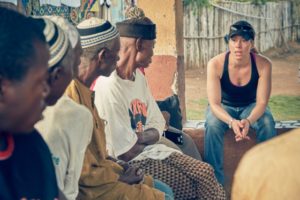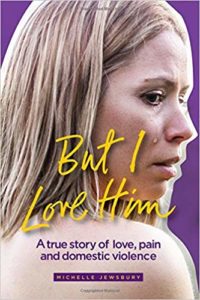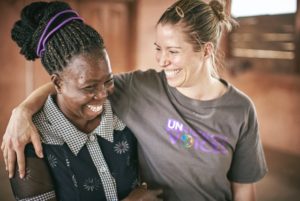Michelle Jewsbury is an author, actress, speaker, and humanitarian. She is passionate about using her natural talents to make the world a better place by combating domestic violence worldwide. May 2014, she took her first humanitarian trip to Guatemala and has been to many countries since, helping underprivileged youth and women. In 2015, she embarked in a career as Vice President for Young Vision Africa (YVA), a non-profit organization doing humanitarian work in Sierra Leone. She stayed with YVA until August 2016 when she decided to leave the organization to focus her efforts on ending domestic violence.
July 2017, Michelle founded Unsilenced Voices, a nonprofit focused on inspiring change in communities around the world by encouraging victims to break free and survivors to speak up about domestic violence and sexual assault. The organization is developing shelters for women and children internationally and has created sensitization programs to educate communities around the globe.
In the entertainment industry, she has worked in casting, as an agent, producer, and actress in television, film, and on the stage. She is known for her acclaimed one-person play But I Love Him, loosely based on her past experience in an abusive relationship. Her memoir was recently published of the same title. You can check out her website for updates on her book launch party and purchase details.
She has also had numerous appearances on talk shows and stages throughout the world. Michelle’s hope is that through her bravery and boldness she will inspire others to take charge and participate in ending domestic violence and sexual assault. Through her book, she hopes to tell the truth of what happened to her and show others it’s ok for them to tell their truth. Readers will recognize themselves throughout the pages of her book, which is why it’s essential and needs to be out there.
To learn more about the work her organization is doing or to connect with Michelle you can visit the following social media accounts: LinkedIn, Facebook, Instagram, YouTube, and Twitter.
From a young age I had dreams of myself surrounded by African children though I never knew the meaning of the dreams. Years later in 2012 was when I found myself in an abusive relationship, it was during that time that I expressed wanting to help people. Around that time was when I began my humanitarian trips to Guatemala and Kenya, Africa. Upon leaving my abusive relationship I had become vice president of a non-profit organization called Young Vision Africa (YVA), their mission work was based in Sierra Leone, where I spoke with groups of women and shared my story for the first time of what I had gone through and about the domestic and sexual violence that takes place within their community.
After returning from my trip, I started working for another organization while volunteering at a women’s shelter on skid row. It was during a trip to San Francisco to interview for the organization Art and Abolition, that I felt God’s presence and received a sign from Him by ways of a complete stranger who I shared my story with and he told me to start my own organization. That was not the first time I’d heard that, but this time I was listening. With previously establishing roots in Sierra Leone, I was drawn back there. God also opened the door for me to also spend time in Ghana as I had met a Ghanaian man in LA by the name of Dr. Bennett whose family lives in Ghana. He told me I could stay at his family home which opened the door for me to do work there as well.
Within the community we hold open forum sensitization meetings, where we invite both male and female community members to attend. During the meetings we teach them what is legally and morally wrong with domestic and sexual violence. What’s surprised me with these communities was the taboo aspect where women are in a position to have to appease their husbands and be submissive to them in all ways. These women are often raped, and the husbands strongly encouraged to marry numerous times if their first wife does not sexually satisfy them. These women often lack a voice. So, encouraging them that they don’t have to take this treatment and stay in this marriage, gives these women their voice back. By sharing my own story of staying with an abuser who beat and raped me, it helped them to look at spousal rape as the violent act it is, no longer the norm that they have grown up being exposed to and witnessing. In fact, they didn’t even realize what they were doing was wrong, because it’s all they’ve ever know.
In these cultures, often, times rape is used to weaken the women, it’s a taboo subject that is rarely if ever broached. So, these meetings are not only eye opening but also a learning lesson for them. We usually have anywhere from between 35-125 community members attending these educational meetings. In Sierra Leone we’ve also partnered with a vocational training center where to date, we’ve helped four young girls who worked as sex workers also known as prostitution. These four girls are no longer on the street and are now going through the vocational training center to learn a skill, like creating the beautiful skirts we buy from them and sell on our website. The reason most women become sex workers is because they are starving. Even children as young as six and seven years old are selling themselves for as little as fifty cents for a bag of rice.
In America a lot of us get to grow up as children. Yet if you grew up in the foster care system or the slums of America or had a harder life, you understand at a very young age how you have to take care of yourself. So, in the US you see children joining gangs because there is a need within their home within their selves and they know that the gang is going to support them. Overseas when parents are starving, a family member is dying from AIDS, grandparents can’t see or walk these children sell themselves on the street to help their family.
Yes, of course. Every non-profit organization has a shop section. Some organizations may outsource the products they sell in their shops. Unsilenced Voices not only does the work but is now also in the fashion industry, though we really want to be known as an industry that helps people.
5) A hot topic within society has been submission within marriage. There seems to be a lot of opinions and misunderstandings as to what the biblical definition is and different cultural interpretations. With being a woman of faith can you explain the biblical truth behind submitting to your husband and why it’s important?
In the Bible it says in Ephesians 5:22-24, “That women must submit to their husbands and that husbands need to love their wives as Jesus loved the church”. Unfortunately, that last verse is usually negated and ignored, which has hurt the church and is the problem. That’s where people get confused. The verse asking men to love their wives like Christ loves the church is about love and respect. The church was the most important thing to Jesus and that’s how women are to be to their husbands – the most important thing. The husband is to protect his wife and not hurt her. Men and women are to co-exist and help each other, being the other’s helpmate. A relationship of mutual respect and submission. Husbands are to submit to their wives as well. Men will still be leaders of the household. The Biblical meaning of submission does not take anything away from a man still being able to be a man.
Though submission is not entirely the problem, people these days are stuck in the old ways and old mindset of how things should still be the way, they were decades ago. Yet we’re supposed to be advanced as a nation, but places like Sierra Leone are 100-150 years still behind the United States. The culture and mindset are as backwards as in the 1900’s. We really need to take a stand. To me, what’s upsetting is when women lie about what happened to them. It takes away from the horrible epidemic that real survivors and victims have been through, lessening the severity of the violence they endured.
6) What strides are you making within the domestic violence movement.
Before the Me Too movement and politics got involved, I went through the process of pressing charges against my abuser. What Me Too has done for us and this movement is bringing more awareness to this. What we are doing as an organization is riding that wave, speaking up, and encouraging other women to speak up. We are going to be having a Speak Up campaign, asking women survivors nationwide to tell their story and send it into us for the campaign. Their stories will bring more awareness to this mainstream topic that Me Too has shined a light on and made more prevalent.
Very difficult! Even after I left that relationship, we were still in communication and during that time he was still emotionally and financially abusing me. That is when I started to document what had happened to me. After documenting everything, that is when I realized how bad my situation was. I used to sit in the back of church, crying because I didn’t want him to do this again to someone else. I wanted to do something, but I also didn’t want to hurt him. I had a very difficult time processing what it was I was supposed to do. I wanted to press charges, but I heard God tell me no, so I listened. At the end of 2015 I received a Facebook message from his current girlfriend whose head he had put through a glass wall, she was pressing criminal charges. At that point I felt more secure moving forward with the process of pressing charges. Though my statute of limitations ran out criminally, I was able to sue him civilly. That statute is something that we need to change because most women are not able to speak up or even process what has happened until years later after that short two-year statute of limitations run outs.
This is a hard question. With my abuser it’s hard for me knowing that my testimony could have huge implications on the trajectory of his life and his livelihood. I do believe you need to forgive. Forgiveness is key to healing for yourself. The thing that I struggle with and what I talk with my therapist about is, at what point does your abuser need to have justice served? Your abuser should be accountable for what he did to you. It is not right what happened, it is wrong, it is evil, it is unhealthy, and potentially deadly. I believe moving forward and pressing charges brings accountability on your abuser. So, the most important thing is to make sure your abuser takes responsibility for his actions. My abuser went through therapy and said he was changing, and I believed him. We went almost a year without him assaulting me physically though he would still abuse me in other ways. When he did assault me again, at that point I knew it wasn’t ever going to change. Moving forward with the process is difficult. I recently sat across from him at the deposition. I was torn as I felt sympathy for him, but I also never want anyone to experience what I’ve gone through. If he gets sentenced and spends time in prison. I know what happens to men who beat on women. I know what happens to them and I don’t want that to happen to him, but it’s also not up to me. I’m just moving forward in the legal process and making sure he takes responsibility for his actions and that there is some type of consequence and repercussion.
10) Would you further detail why it’s not easy to leave your abuser?
You really liked the person you’re with. He puts your head through a wall, spits on you, rapes you, then he looks at you, and tells you how sorry he is while he cries. There is a cycle, a pattern that begins to happen. It start’s from walking on egg shells to him blowing up either emotionally, mentally, physically, or sexually. After that is the apology stage, which is the reason why most victims stay in the relationship. He will vow he loves you and that he’s sorry and that he will never do it again. Because of your feelings toward him and the connection you share with him, you’ll believe him. You truly believe that he will become the man you always dreamed he could be or who he tells you he is. You believe his apologies and you believe that he won’t hurt you again. So, you believe his lies. Though in most cases he will do it again.
At the end of 2015, I sought the help of an attorney. I thought the process would be quick but am still going through it three years later. This is not a short process, it’s very emotional and painful. I’ve had to retell my story many times during police interviews and court interrogations. I’ve had to remember dates, times, and even what I was wearing. You need to make sure you have everything documented and that you remember things correctly. It is a long process and a lot of times victims are not ready or even capable to go through the process.
We’re at the end. The whole process has taken about three years. Total in is eight years, because of four years in the relationship, about a year of doing nothing, and three years for the legal process.
So, you could drive the speed limit, not text while driving, and pay attention while you drive. But that does not 100% guarantee you will not get into an accident. So, my perspective is you need to take care of yourself, take precautions, and look for red flags. If domestic violence is happening in your home, you need to find a safe way to get out. I don’t agree that staying in an abusive relationship is good for you or your children. However, I do understand how difficult it is to leave and why victims don’t. There are red flags to look for before you commit to a husband or an relationship. There are ways to prevent being assaulted, you can carry pepper spray, not walk to your car late at night by yourself, and if you meet a man who is too controlling, don’t stay with him.
I still have nightmares. After my abuser and I stopped communication I used to think that there would be someone waiting to shoot me as I walked out of the elevator in my building. My abuser has a lot of power and a lot of money. So, I definitely thought it was a possibility. Now I understand that I’m still going to have nightmares and be scared when I walk the streets alone. Even be nervous when there is a male passenger in my car because my abuser would scream profanities at me and be very critical of what I was doing wrong when driving. Eventually I wouldn’t drive with him in the car, he’d drive instead. I still get apprehensive regarding the situation but there is hope and healing. The nightmares aren’t as frequent. I’m able to move forward and have healthier relationships. Also, I’ve found that the more you speak the better it makes you feel, so be open and don’t hide things. It’s not your fault. It’s good to speak up because 1 in 4 women in the United States will experience this.
16) Has your story been well received within the church community.
Mine has but I know people whose stories have not been. A lot of people misuse the bible to justify their actions. But it’s very misconstrued. I’m very close to God, He is my best friend. I did not find him the conventional way. I abused drugs for many years and found him as I was lying on my back strung out from cocaine and talking to a ceiling fan. After that I started going to church and was baptized in 2011.
18) Society’s perspective regarding therapy or counseling is that it’s for someone with issues or whose mentally sick. Do you agree?
Who doesn’t have issues. I think people who go to therapy do much better than those who don’t go to therapy. LA is pretty open and accepting where the south and other parts may be less open to talking about one’s feelings. I say screw it and talk about it anyways. If you’re worried about being judged, know that the person you’re speaking to is not the person who is going to judge you, God above is going to judge you. If you’re worried about getting judged for going to therapy, try to look at it from a different point of view. I’m going to therapy to deal with this, so I can have healthy relationships and move on with my life. Those people that come back and say you’re an idiot, or that you have issues do not need to be in your life. If those close to you think you’re crazy for going to therapy, just don’t talk to them about it. People can be very closed minded, especially in our country right now.
19) Is it possible to thrive after trauma? Oh yeah, 100%. So, I’ve decided that through my story, I’m going to help other people and just thrive in general. I’ve written a book, I’ve started a successful non-profit, I have two jobs, I speak to other women who have experienced similar violence, and I coach women. I also have traveled all over the world. I’ve learned new things like scuba diving, which is now my favorite thing to do. I live in a lovely house with two great roommates. I laugh, I go out with my friends, and have cocktails. Yes, you can still thrive and there is hope. This does not define you. Your experiences do not define you.







